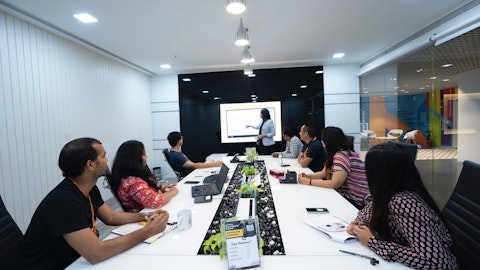People have more insight into it that might change as well. So I guess the trading price of Horizon Kinetics – I mean, trading price of FRMO, you like, reflects what some people believe might be the valuation of all the entities I talk about. And I left out one, which we’re going to add in right now, Consensus Mining, it’s not a big deal. But we still own it, public yet, we’ll be public, and that will have to have a valuation put on. And then you’ll observe the real estate owned, that’s on the books at cost. And the question is, what’s that worth? And it might be worth – some would argue it’s worth more than what it’s on the balance sheet for. So differential between those public entities – the most publicly traded entities that we can value and the ones we don’t or what people assume should be the value, whether that’s right or wrong, we’re going to find out in the not-too-distant future.
So we’ll have to see what happens. So I hope I addressed everything. I hope I did. I think I covered all the main points on that. Anyway Scott’s Liquid Gold, if you’re interested is SLGD. And you know what we’re going to own for, we do own Horizon Kinetics, you could look at the market capitalization of Scott’s Liquid Gold, and you can figure out what its market capitalization is going to be when the deal closes and you can draw some conclusions, I think, but you’ll have to draw those conclusions on your own. So I think that’s a thorough answer. I hope it’s a thorough answer. So maybe we can proceed to the next question, Therese.
Therese Byars: Okay. The next question, I think, has to do with the balance sheet as well. Some of the commentary on the issue of noncontrolling interest confuses me and seems a bit contradictory. Perhaps Murray could comment on his thoughts as to how best to value the company, particularly with respect to the NAV of about $4 per share without noncontrolling and about $8, including noncontrolling.
Murray Stahl: Well, I’m not 100% sure I understand the question. So we take the shareholders’ equity and divide by number of shares, that’s your book value. And the way I would look at it, I mentioned in the prior question, a number of things are not valued market. So the real question is are they worth more than the stated balance sheet value? So is the – are the buildings real estate worth more than their value? I think they are, but is MIAX worth more than its cost base is? I think it is. Is Horizon worth more than it stayed here? I think it is. Is revenue share more worth more than it stayed here? I think it is and so on and so forth. Consensus Mining, we’re going to figure out what happens. So all I can tell you is that’s the differential.
And I can’t tell you what exactly the value should be because everybody has to make up their own mind on that. All I can tell you is judging from the market price relative to the book value. Obviously, people think it’s worth more, not less than the carrying values. And that’s not an unreasonable position to take.
Therese Byars: I wonder if part of the question is about the noncontrolling and the share – book value attributable to the company might be why is there such a large noncontrolling interest that wasn’t in the question, but it might be implied, if you want to speak on that.
Murray Stahl: Why don’t you explain what you mean by that because I’m not sure what the question is so [indiscernible] question.
Therese Byars: Okay. So I think on the balance sheet, we have stockholder’s equity attributable to the company. and then noncontrolling interest. So that may be confusing and I may be interpreting this wrong, but just what the difference is? What’s the noncontrolling?
Murray Stahl: Okay. What difference is, okay. What is the noncontrolling interest? Okay. That’s a good question. Now we control two LLCs they’re known as HK Hard Assets I, HK Hard Assets II. You can see in the footnotes how much we control of each. So the differential, which I think in the case of HK Hard Assets I, is something like 78% doesn’t belong to FRMO. It’s other people, of which, apart from FRMO, the largest holder, let’s say, the HK Hard Assets I, is yours truly. So I own a lot of it personally. So that’s the difference. So FRMO doesn’t – we obviously – we’re just partners in that. So you might say it’s a fund. The market value of that fund is probably $160-something million. It’s growing usually every month. Why is it growing every month because the various partners myself included contributing more securities to it, constantly and hopefully, the market value is going to grow as well.
So basically, that’s what the noncontrolling interest happens to be. It’s basically these two funds, the market value of HK Hard Assets I, it’s a lot bigger than the market value of HK Hard Assets II. For the simple reason that HK Hard Assets I, we’ve been at it for about seven or eight years, something like that. And HK Hard Assets II, we’ve been at it at, I don’t know, 1.5 years, does it sound right, something like that. So it’s going to take a while to build up HK Hard Assets II, the way we build up HK Hard Assets I. That’s a noncontrolling interest. Now maybe the question is, what if you merge a noncontrolling interest into FRMO, would it make a difference? No, it wouldn’t make a difference at all because you still have the same book value.
We take those assets, and presumably, we take shares in it to be more shares outstanding. FRMO have bigger market capitalization. But HK Hard Assets I owns the same thing as FRMO owns, maybe the weightings are in the rounding errors might be slightly different, I don’t know, but maybe the rounding error is slightly different, but they’re not materially different. So we just own more of the same stuff. So I don’t think that affects the valuation whatsoever. But as I said, reasonable minds may differ.





